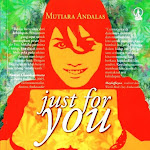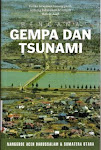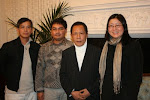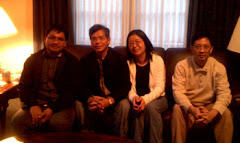By Mutiara Andalas[1]
Dear Sumarsih,
I wrote this letter at the end of summer season. I feel sorry because you will receive this letter wet. I wrote it with a language of tears. I also sealed it with an envelope of tears. I had written it for almost 9 years, and I almost did not finish it. Almost every word came with a long pause of tears. My memory with you, Arief Prijadi, Irma, and Wawan stengthened my shaky hands to finish the letter. I ever received a pen as a gift before I left Jakarta. I wrote the letter with the pen that I ever received from you as a gift before I left Jakarta. I hope that our friendship will restore when I narrate your experience losing your only son during the Semanggi tragedy of 1998 and your struggle to bring justice to him and other victims. A national journal generously provides me a space to narrate my experience encountering the survivors and families of the victims, and pulishes it as a humanitarian letter.
Dear Sumarsih,
Last week an Indonesian human right activist came to US and invited me to join with him to campaign against state-violence. I share my involvement with the survivors and families of the May and Semanggi tragedy of 1998. My whole body suddenly trembled when I narrated your political journey from Joglo, the place where you buried your beloved son after the shooting, to the Presidential palace. I could hear your steps walking, wearing a mourning cloth, and sharing your journey, ”I experience strength as well as weakness. I walk courageously to the Presidential palace to pursue my case as long as God provides life to me.” I could not help shedding my tears when I addressed your name during the seminar. Your serene eyes reminded me of the question that you posed to me almost nine years ago, ”Would you accompany me to seek justice?” I hope you still allow me to answer it.
Dear Sumarsih,
You came from Rogomulyo, a small village that became part of Susuan district and under Semarang territory. You wanted to support life for people close to you. When you married to Arif Prijadi, you pronounced your promise to God to become a faithful wife for him in times of sorrow and joy as long as he lived with you, and to become a good mother for the kids. When you delivered Bernardinus Realino Norma Irmawan, you promised to educate him as a person who lived according to the norm of justice and follows the dynamics of society.
On November 13, 1998 you received a death notice. The Indonesian military troops shot dead Wawan when your beloved son evacuated the injured students who marched near his campus Atmajaya. According to the eyewitnesses, Wawan asked permission from the military officer to evacuate the injured. He waved a white flag as a sign of humanitarian help, but the military troops still shot him right in his chest, went through his heart and hurt his left lung.
Dear Sumarsih,
You visited your deceased son immediately at the Jakarta hospital. You saw him in an open keranda still wore a white t-shirt and a short with his hands bended and his tumb feet bound. You saw a hole at his t-shirt with a reddish brown color surrounding it as if someone burned a cigarette on it. As a mother you could feel the sharp bullet who shot his body and caused his premature death. Wawan died because he defended the life of the injured. You put his body on your lap and murmured, ”God, I accept whenever You want to take his life, but I protest when the military took his death prematurely by violence.”[2]
Dear Sumarsih,
University students, NGO activists, office colleagues, reporters and others came to condole with you. They gathered around his deceased body and witnessed your suffering. They listened to your suffering voice as a mother who lost her son who died premturely in a national tragedy. Dear Sumarsih, we ask your forgiveness if we do respond to your suffeirng sensitively.
Dear Sumarsih,
His death froze your life like a winter season. You almost did not leave the living room, the place where you laid his body before his burial in Joglo public cemetery. You stood near the window for hours praying and waiting for the latest news about his case. You did not feel hungy for weeks because white rice always reminded you of your deceased son who loved to eat white rice during his life. One day you felt a terrible hunger and said to Jesus crying, ”Jesus, I am hungry.” Suffering almost paralyzed your life. When you returned to work place, you felt that your body lost balance and tears flew like a river. You laid your weak body at the wall seeking support until your fellow worker hold your hands and helped you enter into your office. Dear Sumarsih, we beg you to forgive us for we left you to walk alone with shaky feet and weak hands. walk with shaky feet and trembling hands.
You spent most of your times reading the scriptures, praying, and fasting, and visiting the cemetery after his death. You lit a candle of hope when desperation begins to conquer your life. You admit that you experience weakness, tiredness, and even hopelessness. You long for the presence of God when you recite this psalm,” Not in my bow do I trust, nor does my sword bring me victory. You have brought us victory over our enemies, shamed those who hate us. In God we have boasted all the day long; your name we will praise forever” (Ps 44, 7 – 9).[3] Dear Sumarsih, your God has listened to you and responds to your lamentation, ”Come to me Sumarsih when you were weary and heavily burdened. I will give you rest.”
Dear Sumarsih,
You experienced moments of darkness and confusion after his death. You reached a crossroad and you needed a direction that would lead you to truth. You long for God to lit a candle in your heart. You return to God in prayer. You start your day by reading the scriptures and praying, visiting his cemetery at 7.30 a.m., reciting the rosary at 12 p.m., reciting the most holy names of Jesus, the sacred heart of Jesus, and Mary at 5 p.m. You prayed to God before you went to bed and sometimes you could sing to God in the middle of the night. Every time you woke up from your sleep you let your heart approached God.
Dear Sumarsih,
You pray to God using fractured words. You believe that God listen the language of tears. You experience that your God also listens to the the prayer of the tears. Tears often speak eloquently about human suffering. You raised your head when your offered your deceased son to God of life. You brought him back to God proudly. After his death you fasted three times in a week. You follow a Javanese tradition to fast on Thursday. You fast on Friday to remember his death and to remember his burial on Saturday.
Dear Sumarsih,
His death devastated your life. You almost experienced powerlessness to recover from it. You have visited his cemetery at Joglo everyday on the way to your office at Meruya because he has resided in your heart. The cemetery has become a family garden. You have taken care of it by bringing flowers and water to him. It has become a wellspring for your life, a place where you can wash away your tears. When you experience tiredness, you stay there to take a little rest. When no one accompanies you, he consoles you by his presence. Dear Sumarsih, your beloved son ever wrote a poetry without a title:
I seek to follow my conscience
I do it for others
I never expect a reward from them
I only do a small thing: to see them smile
I only want to become a free person
I only do one thing: love.[4]
Dear Sumarsih,
You have walked from Joglo cemetery to the Presidential Palace to seek justice and you do not yet reach final destination. You have moved closer to the Presidential Palace, but the presidential guards have prevented you coming there. Your journey should pass through a longer road even just to approach the presidential palace. You have realized that you should walk further than you ever imagined it. Munir, a human right activist from KontraS who died prematurely because he defended the political victims, ever talked to you: “We need to chase after the cloud in order to pursue justice of law.”[5] Dear Sumarsih, your difficult journey has weakened as well as strengthened your body. Your hair has become grey but they shine with truth. You saw Wawan, your beloved son, hid his face and cried in the dark room. He was the one who wiped away your tears from heaven.
Dear Sumarsih,
You have walked through a difficult path with the family of the victims to seek justice in the Semanggi tragedy. You express humility about your acts, “I never identify myself as a human right activist. My political act shows a high degree of spontaneity. I do ordinary, but important things."[6] You have fought against law enforcers as a simple mother. Your spirit to resist arises from your womb. You lack financial support and suffer law illiteracy. You have experienced law discrimination because they work for the regime that covers institutionalized violence legally. You believe that the military regime does not have any right to decide the life and death of its citizens.
Dear Sumarsih,
You fight with the community of the victims to resists against the Indonesian government who has tried to preserve the anonymity of the victims by scripting official history. The government has also separated the victims from the wider society. They have tried to drop the case legally. If your tears failed to convert their hearts, throwing eggs during government session might awake their conscience. They have tried to reduce a crime against humanity into a misdemeanor case. Some civilians even accused you for giving him birth, but mis-educating him. Some advised to drop your case in order to portray Indonesian positively.[7] Dear Sumarsih, the government has tried to spread the conspiracy of silence in order to cover any crimes against humanity that threatened its power. I ask for your forgiveness because some humanitarian volunteers withdrew our assistance and let you walk alone to pursue justice. I hope you and the family of the victims allow us to to turn our face back to you.
Dear Sumarsih,
Fear fails to weaken your spirit to seek justice for the victims. I would like to send my greeting to the family of Teddy Mardani, Sigit Prasetyo, and Engkus Kurnaedi. I would like also to say my greeting to the families of the victims of Trisakti and Semanggi II tragedy. You kneel before God when you feel tiredness in journey pursuing justice. Wawan, your beloved son, has wiped away your tears from heaven. When you feel tiredness in your pilgrimage, I hope you also allow me to be the hands of God that hold you.
Berkeley, September24, 2007
My Broken Heart Resists
By Maria Katarina Sumarsih[8]
Dear Rev. Mutiara Andalas,
I experience the briefness of 9 years after the tragedy. I have remembered my deceased son and the volunteer team for humanity (TRuK). I remembered that I often asked you when were in the same car on the way to the government office, “What should I say?” I also asked the same question when a private television INDOSIAR on May 30, 2005 invited me to share my faith life during “Penyejuk Iman” session discussing “Jesus the Lord of Peace.” I have kept my memories of you.
Dear Rev. Andalas,
I have recognized the presence and power of God in my family after the tragedy. I feel embarrassment because I could not help crying after the military shot dead my son. His premature death shed my tears easily. I sometimes passed through my day crying. Rev. Sandyawan Sumardi told me that it was normal. Karlina Leksono also told me that it is part of the process.
I experience gratefulness because I do not lose my God. To thank you for many people who have showed their empathy to our suffering, I have promised to wipe away my tears. I am joyful with Wawan because he gave his precious life to the suffering people under the New Order who worshipped the idols of authoritarianism, corruption, and militarism. I wanted to go with and stay with Jesus, but I know the difficulty to accomplish it. I seek to surrender myself to God and ask God to light a candle that guides my journey.
Rev. Andalas,
I have immersed into a political arena and have stood face to face with the regime that authorizes political violence. The regime asserts the rule of law in its constitution, but abuses the survivors and family of the victims who seek law protection. They lack political honesty as well as a sense of humanity. They play a dangerous game by harming our humanity.
I realize that they compromise law. Law 26/2000 about Human Right Court promises that there will be a court to pursue the case of the victims of the Semanggi tragedy through Human Right Court Ad Hoc turns out to be merely an accessory only. A body that represents the people turns into a body that misrepresents them. The House of the Representatives declared that the shootings toward students at
The national committee for human right in
Romo,
I sometimes experience helplessness passing through a long journey to justice. I occasionally overlook my role as part of the family of the victims. I experience temptation to do great things in relation with the case. I forget that I have a little role in eradicating state-violence. I often imagined myself as a short woman trying to match the moon. I also overlook the role of the government as the only agency who will stop the recurrent cyle of violence. I realize that I should participate to stop state-violence.
I admit that I sometimes lose direction about the struggle. I seek to devote my life resisting the regime that causes premature deaths toward ordinary citizens. On the contrary, the regime has tried to weaken our struggle by disqualify the case and exempting the perpetrator from punishment.
 The survivors and the family of the victims can resist social amnesia, but many of them withdrew from the struggle because they experienced exhaustion and did not see any hopeful future for their case. Humanitarian groups who have assisted us, such as KontraS, have provided alternative activities to resist amnesia. I have consulted my activities with Rev. Sandyawan and he invites me to appreciate small victories in seeking justice. We have used to bring our case to the government and we have found a silent protest in front of the presidencial palace every Thursday afternoon to resist social forgetting.
The survivors and the family of the victims can resist social amnesia, but many of them withdrew from the struggle because they experienced exhaustion and did not see any hopeful future for their case. Humanitarian groups who have assisted us, such as KontraS, have provided alternative activities to resist amnesia. I have consulted my activities with Rev. Sandyawan and he invites me to appreciate small victories in seeking justice. We have used to bring our case to the government and we have found a silent protest in front of the presidencial palace every Thursday afternoon to resist social forgetting.
We have been demonstrated in front of the presidencial palace since January 18, 2007 on Thursday from 04.00 – 05.00 p.m. We stand silently facing the presidencial and wear black costumes. We tell publics about crimes against humanity perpetrated or supported by the state. We display posters, distribute pamflets, and send a letter to the president. When I wrote this setter, we just hold the 36th silent protest.
 A few survivors and the their family have attended Kamisan, while the others have come irregularly. Different groups of state-violent victims have joined our silent protest. University students, humanitarian activists and civilians Express their solidarity by joining our public act. The military who guarded the area expelled us when they prepared the celebration of our 62nd independence. They also expelled the silent protesters when Vladimir Putin visited the President. Our broken heart resisted the violent expelsion.
A few survivors and the their family have attended Kamisan, while the others have come irregularly. Different groups of state-violent victims have joined our silent protest. University students, humanitarian activists and civilians Express their solidarity by joining our public act. The military who guarded the area expelled us when they prepared the celebration of our 62nd independence. They also expelled the silent protesters when Vladimir Putin visited the President. Our broken heart resisted the violent expelsion.
Rev. Andalas,
We pursue the case so that the government to solve all crimes against humanity in Indonesia. The government have kept their silence on the case. We have stood silently in front of the presidencial palace because it represents national authority. We will continue to stand for justice until the government resolves the case. I pray to God that God may grant my request.
Jakarta, October 1, 2007
[1] I previously published this paper in the BASIS journal on November – December 2007 edition. This paper will become part of my forthcoming book entitled Political Anamesis: Berpaling kepada Wajah Korban, Melawan Politik Amnesia (2008) to commemorate the 10th anniversary of the May – Semanggi tragedy of 1998.
[2] Maria Hartiningsih, KOMPAS, on December 10, 2004; Budie Santi , JurnalPerempuan.com, on January 23, 2004; Radio Singapore International, on December 23, 2004.
[3] Excerpted from “Kisah Maria Katarina Sumarsih, Perempuan Akar Rumput dalam Perjuangan menuntut Kebenaran dan Keadilan”
[4] Excepted from unpublished poetry by Bernardinus Realino Norma Imawan as quoted by Maria Katarina Sumarsih, “Kisah Maria Katarina Sumarsih, Perempuan Akar Rumput dalam Perjuangan menuntut Kebenaran dan Keadilan.”
[5] Maria Hartiningsih, KOMPAS, on December 10,
[6] GATRA, on December 10, 2004.
[7] Maria Hartiningsih, Swara KOMPAS, on December 10, 2003.
[8] Maria Katarina Sumarsih previously published this paper in BASIS journal on November – December 2007 edition. This paper will become a part of a forthcoming book entitled Politik Anamnesis: Berpaling kepada Wajah Korban, Melawan Politik Amnesia (2008) to commemorate the 10th anniversary of the May – Semanggi tragedy of 1998.






















No comments:
Post a Comment